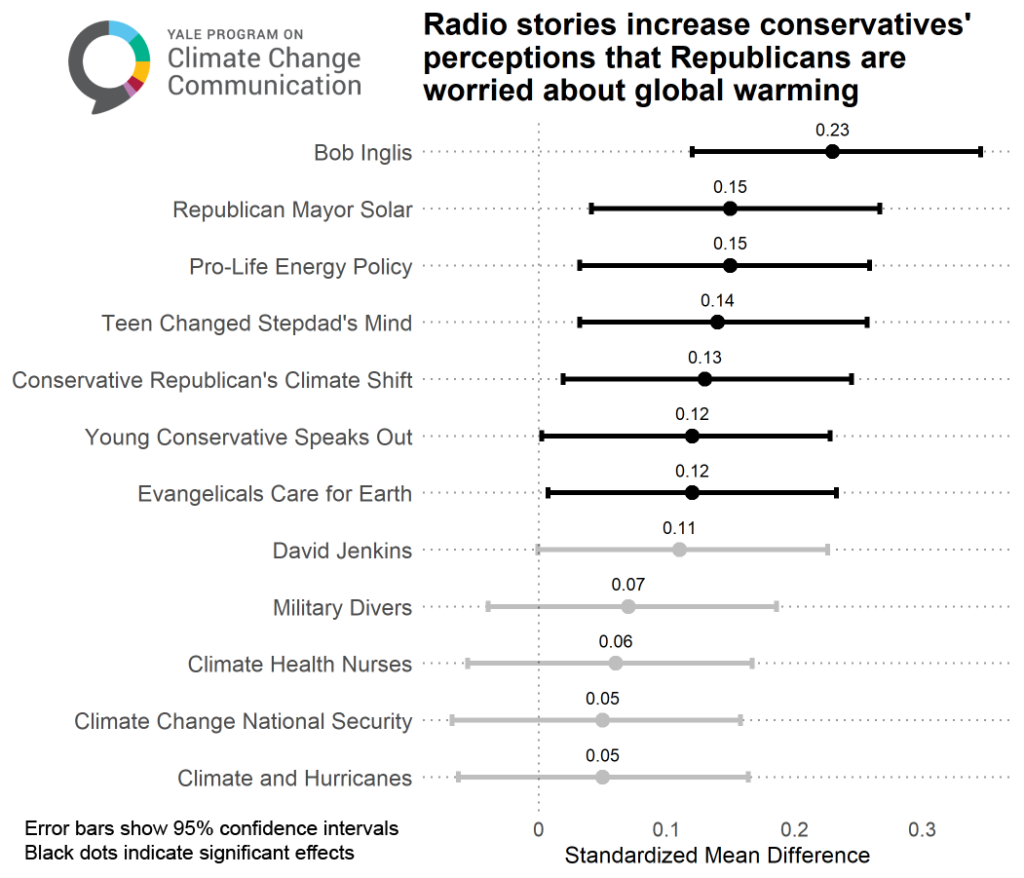Climate Note · Jul 21, 2021
Radio stories increase conservatives’ beliefs that Republicans are worried about climate change
By Francis Commerçon, Matthew Goldberg, Seth Rosenthal and Anthony Leiserowitz
Filed under: Audiences, Beliefs & Attitudes, Messaging and Policy & Politics

We are pleased to share the results of a new study testing the effect of twelve different climate change messages among conservatives.
Our prior research has found that tailored messages can persuade Republicans that climate change is happening, human-caused, and harmful. But it is also important for Republicans to understand that many of their fellow party members are worried about climate change. Communicating this fact can help amplify this social norm among Republicans. This in turn can help convey that climate change does not have to be a partisan issue – people across the political spectrum care about it.
In this study, we examined whether audio stories featuring Republicans and conservatives talking about their concerns about climate change or the pro-climate actions they are taking can increase conservatives’ understanding that many Republicans are worried about climate change. We asked conservative respondents (N = 2,742) to listen to one of twelve different climate change-related stories, ten of which emphasized conservative themes and values, including free markets, pro-life values, national security, and religion, and showcased Republican and conservative leaders who advocate for climate change solutions. The other two stories emphasized non-conservative themes, including the need for climate education in nurses’ training and how climate change affects hurricanes. Finally, a control condition featured a story about an unrelated topic.
The climate change stories were drawn from the archives of Yale Climate Connections, which broadcasts a new 90-second radio story about climate change each weekday on more than 680 stations across the United States. A short description and link to each story is displayed in the table below.
| Yale Climate Connections Radio Story | Description |
| Bob Inglis | Former Republican congressman Bob Inglis advocates for free enterprise solutions for clean energy through his non-profit, RepublicEN. |
| Republican Mayor Solar | A Republican mayor in Abita Springs, LA, is investing in solar energy as a practical, economic, and responsible solution for the future of his community. |
| Pro-life Energy Policy | Michele Comb, founder of Young Conservatives for Energy Reform, advocates for clean energy as a family issue, because pollution from coal-fired power plants harms the unborn. |
| Teen Changed Stepdad’s Mind | Conservative teenager Frank Lawson’s views about climate change evolved, and he then convinced his conservative stepdad that climate change is real and human-caused. |
| Conservative Republican’s Climate Shift | Republican congressman Bob Inglis shifted his views on climate change and now advocates for free-enterprise solutions. |
| Young Conservative Speaks Out | Tyler Gillette, a young conservative climate activist, is an example of how young conservatives are concerned about global warming. |
| Evangelicals Care for Earth | Evangelical Christian Lindsay Linsky encourages her fellow Christians to take care of the Earth because it is God’s creation. |
| David Jenkins | Global warming is a moral and ethical issue for conservatives. David Jenkins, director of the non-profit Conservatives for Responsible Stewardship, urges conservatives to not leave climate solutions up to Democrats. |
| Military Divers | Former combat divers restore coral reefs threatened by climate change through the organization Force Blue. |
| Climate Health Nurses | Climate change education should be a more important part of nurses’ education, because nurses are important advocates for the health of populations vulnerable to climate change. |
| Climate and Hurricanes | Global warming increases the strength and duration of hurricanes, as explained by Astrid Caldas of the Union of Concerned Scientists. |
Respondents were randomly assigned to listen to one of the twelve climate change radio stories or to the control story. We measured respondents’ perceptions of how much Republicans are worried about global warming before and after they listened to the story.
We found that seven of the twelve radio stories significantly increased conservatives’ perceptions that Republicans are worried about global warming. The effect sizes were modest in magnitude, but the results indicate that even a single 90-second radio story can shift perceptions of a social norm – an important precursor to changing climate beliefs, attitudes, and behavior. 
We also measured respondents’ own beliefs about whether global warming is happening, human-caused, a source of worry, harmful to themselves and future generations, and an important issue. Three stories increased conservatives’ beliefs that global warming is human-caused (Teen Changed Stepdad’s Mind, David Jenkins, and Conservative Republican’s Climate Shift), and four stories increased beliefs that global warming will harm them personally (Teen Changed Stepdad’s Mind, Pro-Life Energy Policy, David Jenkins, and Climate Change National Security). These beliefs are often important predicates of support for climate policy.
Two stories were particularly effective at shifting conservatives’ personal climate change beliefs. Teen Changed Stepdad’s Mind increased conservatives’ beliefs that global warming is human-caused, that global warming will harm them personally, and that Republicans are worried about global warming. In this story, a conservative teenager learned that climate change is real and human-caused. He then convinced his conservative stepdad, and now they talk about climate change with others.
Likewise, the David Jenkins story significantly increased conservatives’ beliefs that global warming is human-caused, perceptions that it would harm them personally, and their own level of worry about global warming. This story featured a conservative leader who advocates for free-market solutions to climate change and encourages his fellow conservatives to not leave climate change policy up to Democrats.
Overall, these results indicate that stories featuring conservatives and Republicans who care about climate change can influence perceived social norms among conservatives, as well as increase key beliefs relevant for climate action.